Antonyms Teaching Resources
Are you teaching antonyms this school year? Printable worksheets, digital activities, and more options for the English teacher have been created just for you by the Teach Starter teacher team!
Explore a curriculum-aligned teaching resource collection full of options for your writing or reading rotations with editable options to help differentiate instruction for your individual students.
Has it been a while since you were teaching this part of the English curriculum? Our teacher team knows what it’s like to suddenly teach a brand-new grade level after years away, so we’ve put together a quick refresher on antonyms! Read on for a guide on the meaning of antonym, how we use antonyms, and even how to pronounce this tricky word!
Definition of Antonym for Kids
The obvious place to start teaching this topic is with an antomy definition, isn't it? Your students will need to know what an antonym is and how it differs from a synonym. Put in the most simple terms that kids can understand, an antonym is a word that means the opposite of another word.
For example, 'tall' is the antonym of 'short' because the words mean the opposite of one another.
What Is an Antonym?
Let's dig a little deeper than that definition and take a look at what an antonym actually is and does in written texts.
Typically adjectives or adverbs, these words are valuable for young writers to learn as they help us describe things more precisely and increase our vocabulary.
Alongside learning about synonyms, teaching students about this type of vocabulary word also helps them as they begin to compare and contrast things. After all, when we know that something is not like something else, it helps us identify what that thing is!
How Do You Pronounce Antonym?
Are your students' tongues tripping over the pronunciation of this word? Have them slow down their speech and try breaking it up into three sounds — [AN] + [TUH] + [NIM].
Antonym Examples for Kids
Using examples can help your students start to grasp the concept of how to use these words in their own writing. Here are some fun examples of antonyms that kids always love:
- Lazy — Active
- Boring — Fun
- Yummy — Yucky
5 Types of Antonyms
It may be a fairly simple thing to explain that two words with opposite meanings fit into the antonym category, but we would be remiss if we didn't address that there are various types! Understanding the way these break down can help students better understand how to use words effectively to convey their intended meaning.
The five types of antonyms our students work with are:
Gradable antonyms
These are antonyms that represent opposite ends of a spectrum and can be used to describe different degrees of a quality. Some examples include:
- Hot and cold
- Tall and short
- Big and small
- Fast and slow
- Young and old
Complementary antonyms
This type of antonym represents a binary relationship where the presence of one implies the absence of the other. In other (more kid-friendly) terms, they're opposites but they work together to describe the same thing. For example, 'on' and 'off' are complementary antonyms. If you want to describe a light switch, you might say 'turn the light on' or 'turn the light off.' Both sentences include antonyms to describe the same action.
Some examples include:
- Alive and dead
- Male and female
- On and off
- Push and pull
- Day and night
Complementary antonyms are helpful because they give us a complete picture of something by showing us both sides of it. It's like having two puzzle pieces that fit together perfectly to make a complete picture.
Relational antonyms
This type of antonym helps us to describe a relationship between two concepts. Some examples include:
- Parent and child
- Teacher and student
- Borrower and lender
- Employer and employee
Auto-antonyms
These are words that can be very confusing to kids. That's because these words are technically the same, but they have opposite meanings depending on the context in which they are used. Some examples include:
- Cleaved (to stick together) and cleaved (to split apart)
- Sanction (to permit) and sanction (to punish)
- Dust (to remove dust) and dust (to add dust)
- Oversight (to supervise) and oversight (a mistake)
Converse antonyms
Our final type on this list is a set of words that describe the relationship between two concepts where one concept implies the other. Some examples include:
- Buy and sell
- Borrow and lend
- Teach and learn
- Above and below
Fun Antonym Activities for Kids
Teaching antonyms can be exciting, fun, and engaging if you use the right resources, but it can be boring, dull, and tedious if you don't get it right (see what we did there?!). This collection of antonym activities for kids is stocked with ideas to make sure your antonym lessons are the former:
- Antonym games
- Synonyms and antonyms worksheets
- Antonym matching activities
- Antonym posters
- Antonym anchor charts
- Google Interactive antonym activities
- Antonym flashcards
- Thesaurus skills
- And more!
- Free Plan
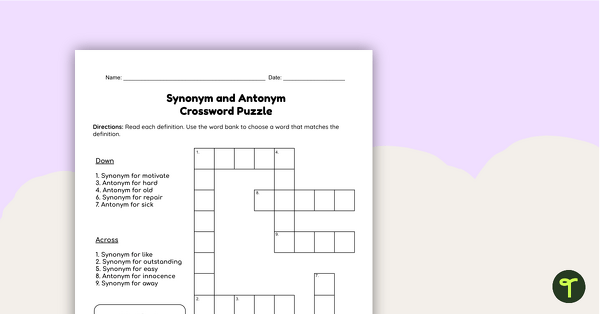
Synonym and Antonym Crossword Puzzle
Review vocabulary skills and boost your students’ knowledge of synonyms and antonyms with a crossword puzzle worksheet.
- Free Plan
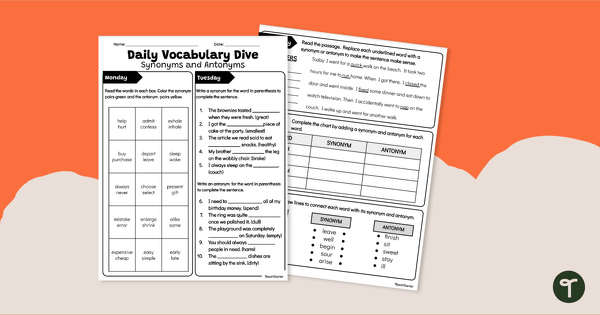
Daily Vocabulary Dive - Synonyms and Antonyms Worksheet
Give your students a daily dose of synonym and antonym review with a 5-day vocabulary warm-up worksheet.
- Plus Plan
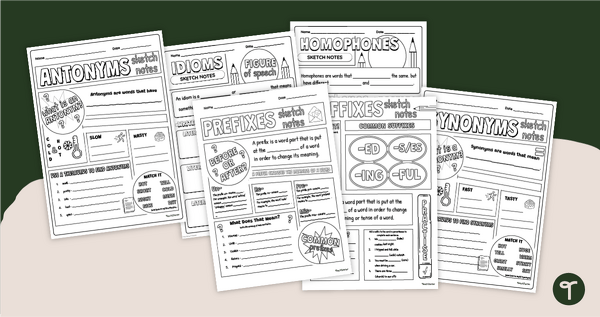
Vocabulary Sketch Notes Template Pack
Review a variety of vocabulary skills and help your students build note-taking skills with our printable Vocabulary Sketch Notes Template Pack.
- Plus Plan
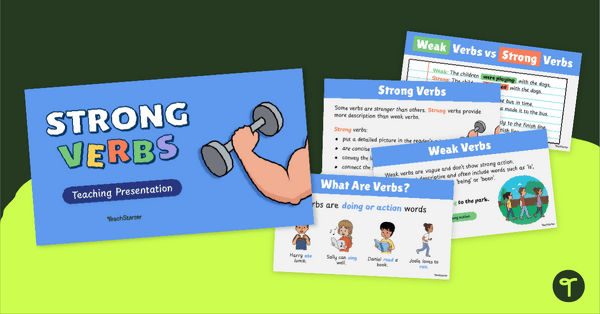
Strong Verbs Teaching Slides
Discover how to use strong verbs in sentences with this set of teaching slides.
- Plus Plan
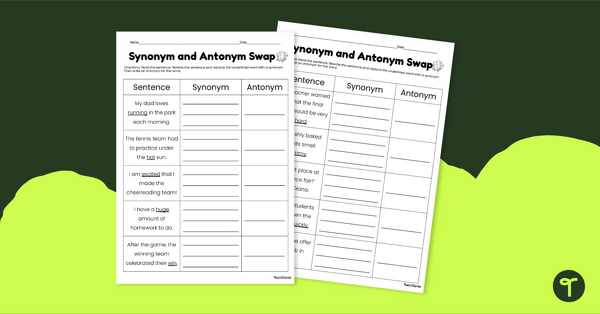
Synonym and Antonym Swap Worksheet
Build vocabulary skills with a printable synonyms and antonyms worksheet.
- Free Plan
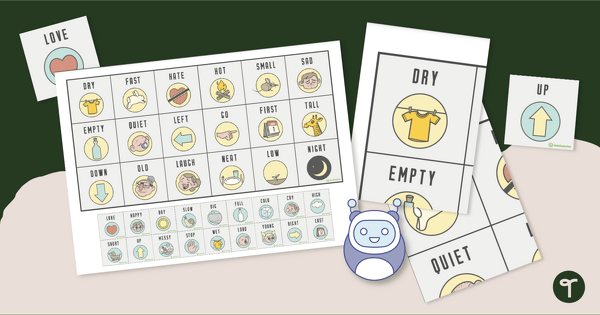
Antonym Coding Robot Mat
Practise coding for kids and matching antonym pairs with a coding robot mat.
- Plus Plan
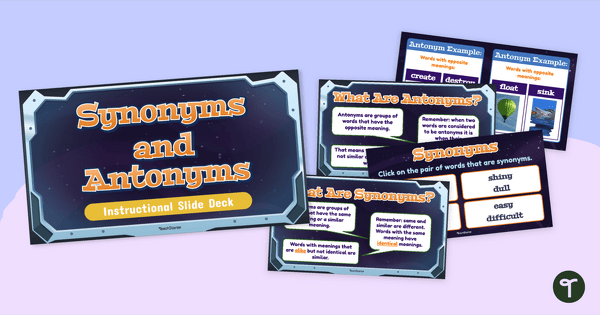
Synonym and Antonym Instructional Slides
Build skills in identifying synonyms and antonyms with an interactive instructional slide deck.
- Plus Plan
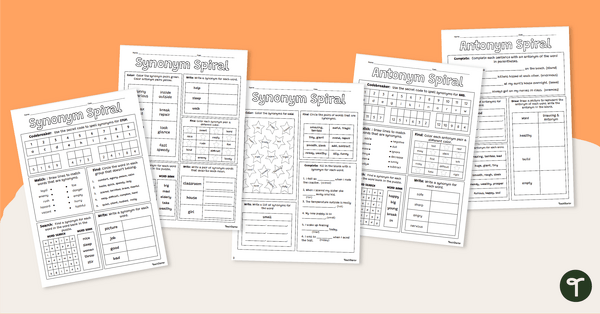
Synonyms and Antonyms Practise - Worksheets
Boost vocabulary skills with daily review worksheets on synonyms and antonyms.
- Plus Plan
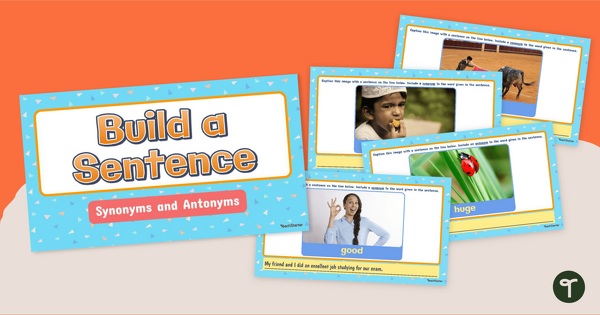
Synonyms and Antonyms - Build a Sentence Interactive
Build a strong vocabulary and sentence-writing skills with an interactive synonyms and antonyms sentence-building activity.
- Plus Plan
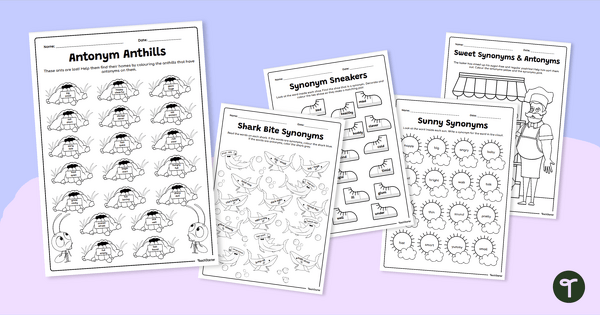
Synonyms and Antonyms - Worksheet Pack
Practice identifying and using synonyms and antonyms with five fun vocabulary worksheets.
- Plus Plan
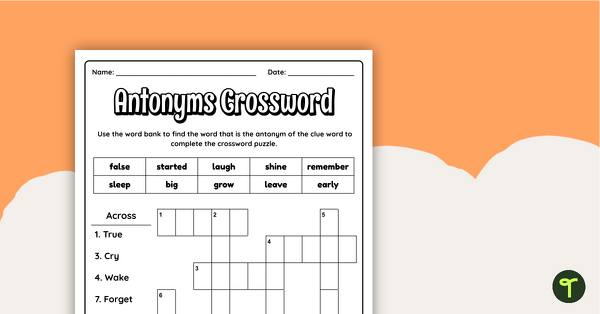
Antonyms Crossword Puzzle
Turn your language learners into vocabulary superstars with a fun antonym crossword puzzle.
- Plus Plan
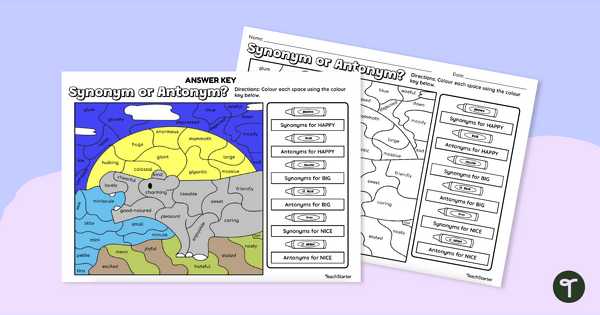
Colour By Code Worksheet - Synonyms and Antonyms
Reveal the hidden picture and practise using synonyms and antonyms with a vocabulary colour-by-code worksheet.
- Plus Plan
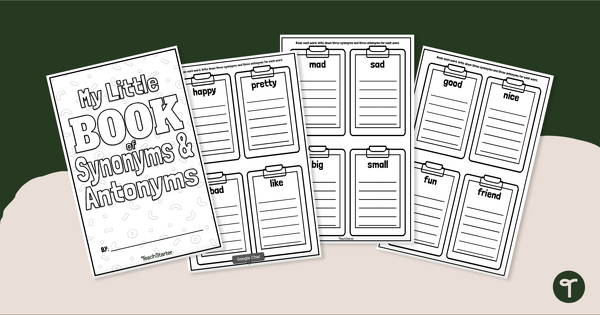
My Book of Synonyms and Antonyms
Combat overused words in your students’ writings by having them build their very own book of synonyms and antonyms.
- Plus Plan
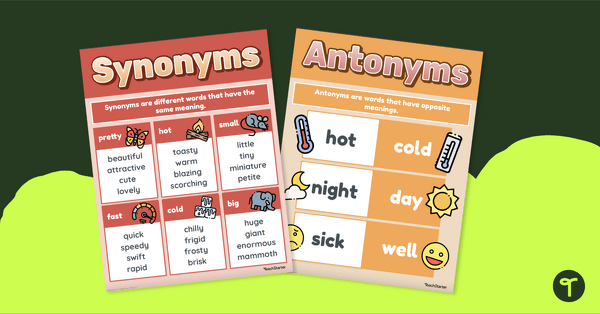
Synonym and Antonym Posters
Print a pair of handy synonym and antonym anchor charts for your students to reference during writing lessons.
- Plus Plan
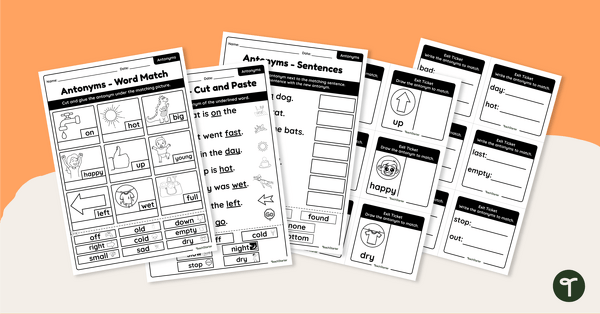
Antonyms Worksheets - Year 1
Practise reading and identifying antonyms with a pack of five antonym worksheets for Year 1 students.
- Plus Plan
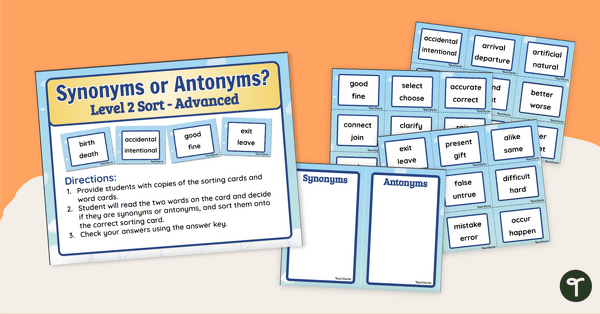
Synonyms or Antonyms? Level 2 Sorting Activity
Identify synonyms and antonyms with a sorting activity designed for upper years students.
- Plus Plan
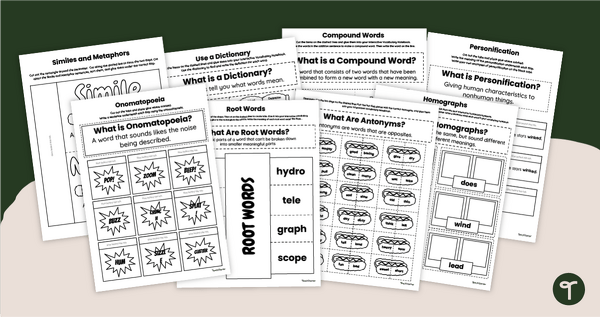
Vocabulary Foldables for Interactive Notebooks
Use Vocabulary Foldables to help your students demonstrate and review a variety of vocabulary concepts.
- Plus Plan
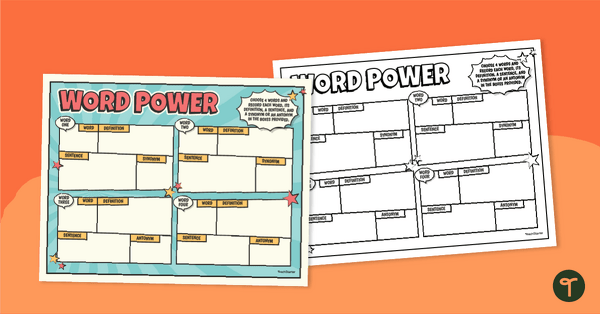
Word Power - Comic-Inspired Vocabulary Sheet
Expand your students’ vocabulary skills with our Word Power! Comic Book-Inspired Vocabulary Sheet!
- Plus Plan
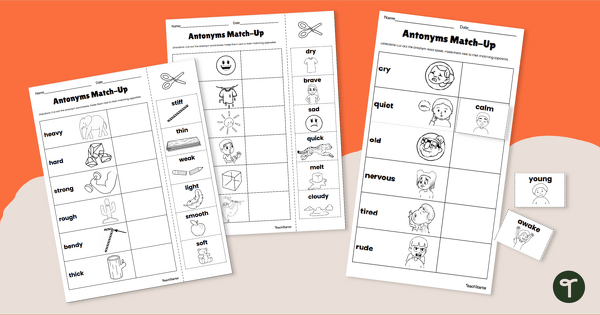
Antonyms are Opposite Words - Cut and Paste Worksheets
Build vocabulary skills with a cut-and-paste opposite words worksheets
- Plus Plan
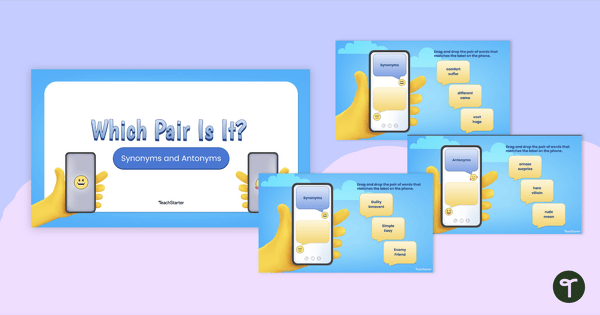
Which Pair Is It? Synonyms and Antonyms Interactive Activity
Help your students learn new synonyms and antonyms with an interactive matching activity.
- Plus Plan
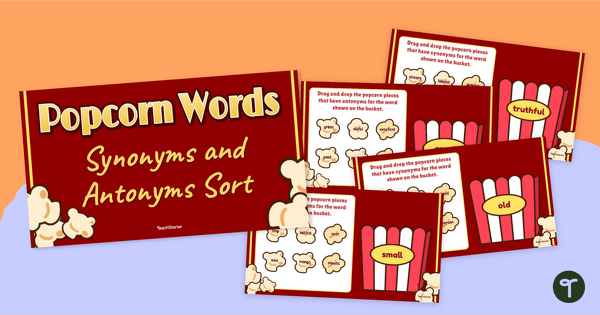
Popcorn Synonyms and Antonyms - Interactive Sort
Make your students’ vocabulary skills ’POP’ with an interactive, drag-and-drop synonym and antonym activity.
- Plus Plan
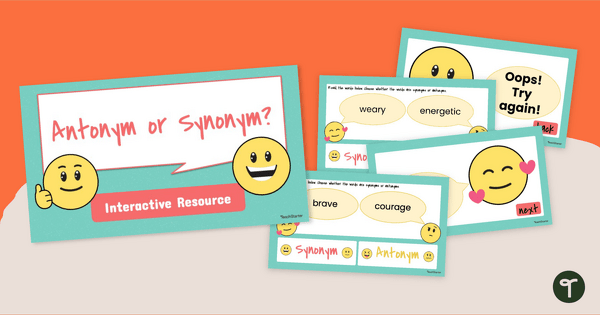
Antonym or Synonym? Interactive Resource
Boost vocabulary skills using a fun emoji-themed self-checking activity with synonyms and antonyms!
- Plus Plan
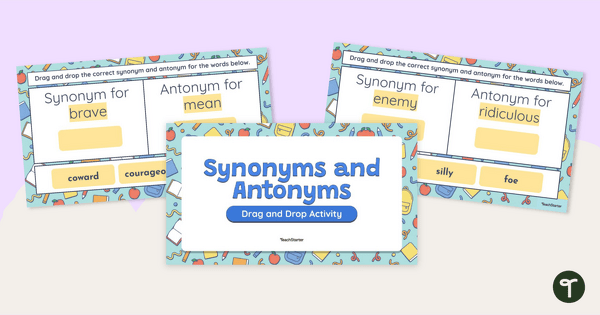
Synonyms and Antonyms - Digital Sorting Activity
Identify synonyms and antonyms with an interactive, drag-and-drop sorting activity.
- Plus Plan
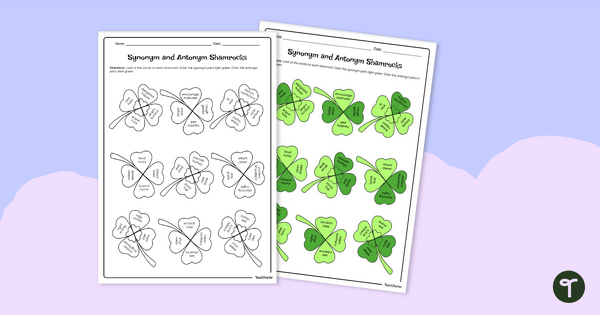
Shamrock Synonyms and Antonyms Worksheet
Build vocabulary with a Shamrock Synonyms and Antonyms worksheet.
- Plus Plan
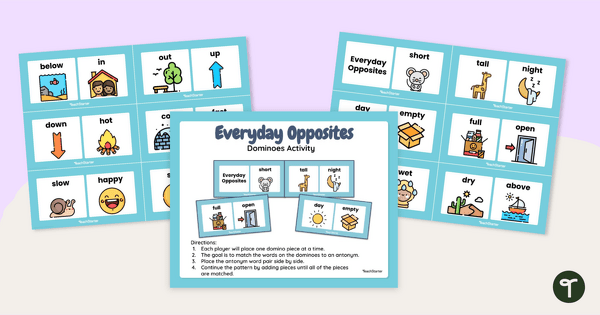
Everyday Opposites - Antonym Game
Have some wordplay fun with an Everyday Opposites domino game!
- Plus Plan
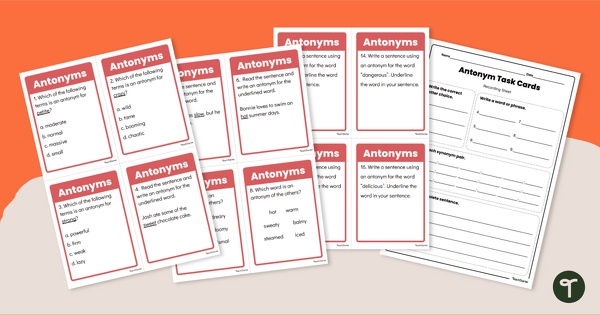
Antonyms Task Cards
Build vocabulary and recognition of antonyms with a set of 24 task cards.
- Plus Plan
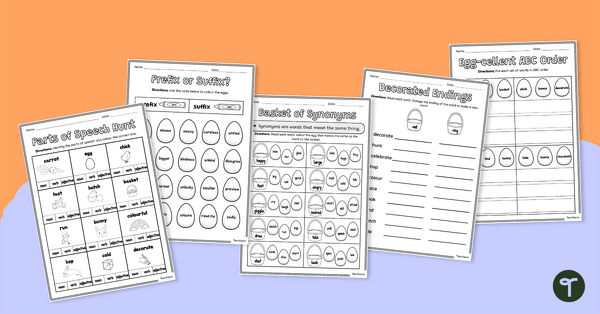
Easter Worksheets - Grammar Practise
Practise skills learnt in literacy with this Easter-themed grammar activity pack.
- Plus Plan
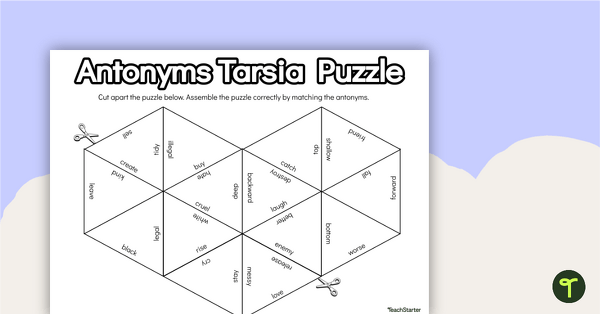
Antonyms Tarsia Puzzle
Match antonym pairs with an engaging opposite words tarsia puzzle.
- Plus Plan
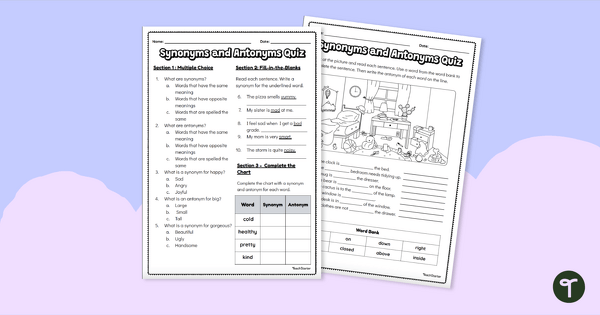
Synonyms and Antonyms Quiz
Assess your students’ knowledge of synonyms and antonyms with a vocabulary quiz.
- Plus Plan
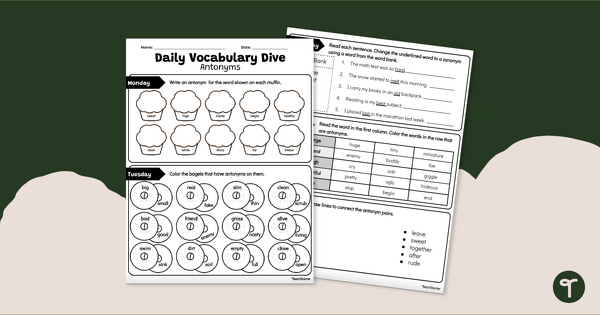
Daily Vocabulary Dive - Antonyms Worksheet
Give your students a daily dose of vocabulary practice with a five-day Antonym Review Worksheet.
- Plus Plan
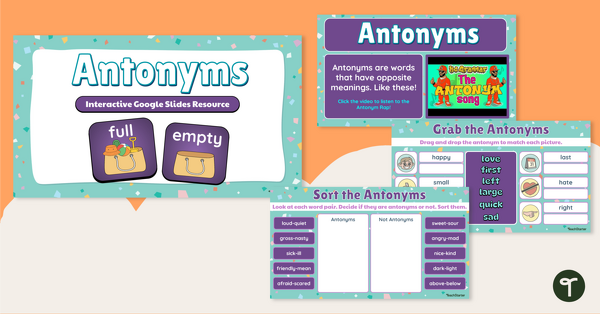
Antonyms Interactive Activity
Discover the world of antonyms with an engaging digital learning activity.
- Free Plan
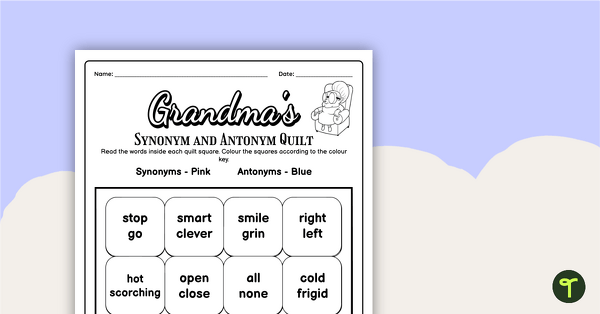
Synonyms and Antonyms Worksheet - Colour by Code
Explore pairs of synonyms and antonyms with this colour-code worksheet.